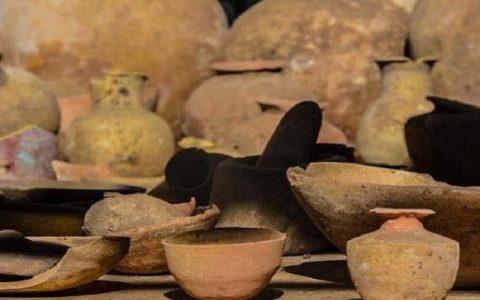
Over 100 priceless Assyrian artefacts plundered from ancient ruins hidden under the home of an ISIS leader in Mosul
More than 100 priceless Assyrian artefacts that were plundered from ancient ruins in Iraq have reportedly been found hidden under the home of an ISIS leader in Mosul.
The ancient clay pots and vases are believed to have come from the Nineveh ruins as well as Nimrud, which has been reduced to ruins by the terror group.
Nimrud had been under the control of ISIS from 2014 but it was recaptured by Iraqi forces in the battle for Mosul in November.
Now, the Telegraph has reported that Iraqi authorities have stumbled upon the priceless items while searching a house in the Az-Zirai neighbourhood in the east of Mosul after the ISIS commander claimed he was a civilian.
Among the artefacts found were said to be a dozen clay pots, large vases, pottery, a hand mill and other small pieces.
Iraqi MP Talib al-Maa’mari told the newspaper: ‘During a tour of homes in the former Christian area of Mosul, the army received a tip off from a local resident.
‘When the special forces searched this one house, which was being used by an ISIS emir, we were surprised to find many priceless artefacts.
‘But one in particular is very special – it was quite an incredible find.’
ISIS are believed to have made millions from the sale of ancient artefacts on the black market since capturing Mosul.
In the past three years, ISIS has deliberately destroyed cultural heritage in Iraq, Syria, and to a lesser extent in Libya.
The ancient Iraqi city of Nimrud – the capital of the Assyrian empire – is one thar has been reduced to rubble by the terror group, who were forced out of the famed archaeological site in November.
The jihadis was driven out by Iraqi forces, but left behind scenes of devastation, with much of the ancient Assyrian city destroyed.
Nimrud, in northern Iraq, was 3,000 years ago the capital of what is believed to have been the world’s first empire.
Meanwhile, the battle for Mosul has continued to rage on with the Iraqi army buoyed by the victory of liberating the eastern half of the city.
Lieutenant Colonel Diya Lafta said troops from his 9th Division began advancing toward two villages just north of Mosul on Thursday morning and ‘after a few hours they were liberated’ from ISIS militants.
By afternoon, the village of Shereikhan had been largely freed but fighting continued in the villages beyond.
Thursday’s military operation forced hundreds of civilians to flee. Families escaping the clashes on foot clogged the road leading into Mosul as a cloud of smoke from an ISIS suicide bombing rose above the horizon.
Source: /Daily Mail





